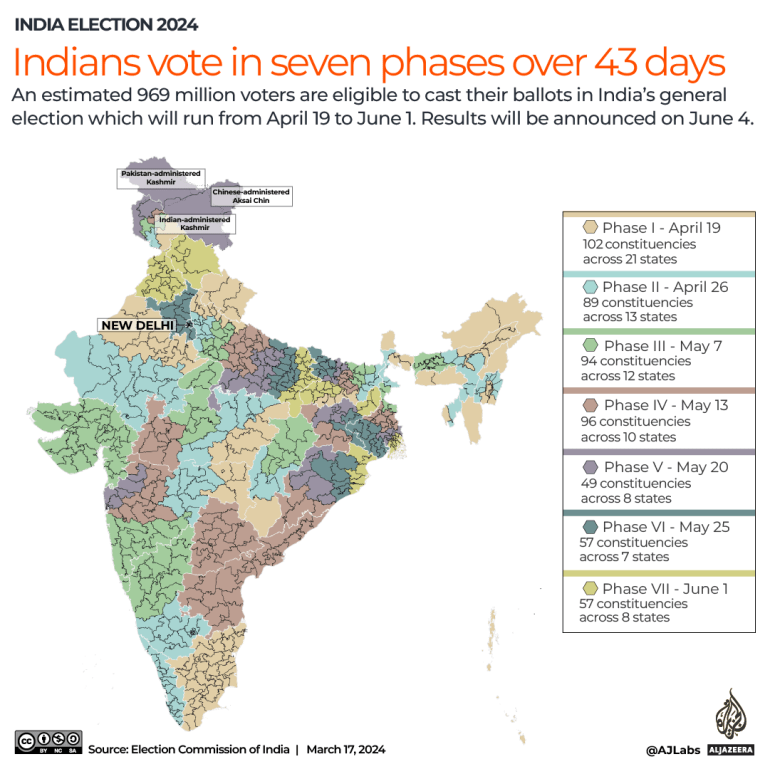India’s governing party has pledged to create jobs, boost infrastructure and expand welfare programmes if it wins a third term in the marathon general election, starting in less than a week.
Releasing its manifesto ahead of the polls, Prime Minister Narendra Modi’s Bharatiya Janata Party (BJP) on Sunday also promised to introduce a new common civil code for the country, calling it a crucial step for gender equality in the world’s most populous nation.
The general election, which begins on April 19, will be held in seven stages, until June 1. Votes are due to be counted on June 4 and results are expected the same day.
Seeking to address key voter concerns after releasing the manifesto, titled Modi’s Guarantee, at the BJP headquarters in New Delhi, Modi said, “Our focus is on dignity of life … on quality of life, our focus is also on creating jobs through investment.”
Modi, 73, is widely tipped to win a record-equalling third term on the back of his 10-year record – which includes economic growth, infrastructure projects, welfare handouts – and aggressive Hindu nationalism.
He has been campaigning extensively across the country, promising to expand India’s economy to $5 trillion by 2027 from about $3.7 trillion. He also promises to put India on track to become a developed country by 2047, when the country celebrates 100 years of independence from British colonialists.
Surveys, however, suggest unemployment, inflation and rural distress remain the issues of concern among the voters. Last week, a survey by Lokniti-CSDS said unemployment was the primary concern of 27 percent of the 10,000 voters across 19 of India’s 28 states, with rising prices coming second at 23 percent despite the country’s strong economy.
Addressing these issues will be Modi’s biggest challenge.
“India’s youth will not have even imagined the number of opportunities that will come their way,” he told cheering BJP members, including senior federal ministers who sat in the audience on Sunday, wearing stoles featuring the BJP’s symbol – lotus.
‘Uniform civil code’
But critics say another term for the BJP could undermine India’s status as a secular democracy, citing ongoing attacks by Hindu supremacist groups on the minorities, particularly Muslims, and shrinking space for dissent and free media.
The party’s manifesto waded into a polarising debate by reaffirming its stand on the so-called uniform civil code (UCC), which would standardise laws for personal matters such as marriage, divorce and inheritance across faiths and religious communities.
The party “believes that there cannot be gender equality till such time Bharat adopts a uniform civil code, which protects the rights of all women”, the manifesto said, using Modi’s preferred name for the country.

India’s 1.4 billion people are subject to a common criminal law, but rules on personal matters such as marriage, divorce and inheritance vary based on the customary traditions of different communities and faiths.
Women’s rights vary considerably, depending on which code they fall under – Hindu sons and daughters theoretically enjoy equal inheritance rights while Muslim daughters are entitled only to a fraction of any male heir’s inheritance.
Many Hindu right-wing politicians, jurists and reformists have described these custom-based codes as regressive and have lobbied for a code that would apply to all Indians equally.
But many communities, particularly Muslims, fear a UCC would infringe on their religious laws and see it as an attack on their identity and against India’s secular constitution.
The BJP’s 76-page manifesto did not refer to either Hinduism or Islam by name, but it pitched to Muslim women voters by pointing out it had protected them from the “barbaric” practice of “instant divorce”.
Focus on welfare
Modi also promised to expand welfare programmes, including bringing all Indians above the age of 70 under an existing free health insurance programme and pushing piped cooking gas connections to all houses to follow up on a subsidised cooking gas cylinder programme launched in 2016.
Other promises include raising the cap on loans for non-farming small and micro borrowers, offering free housing for another 30 million poor and keeping up a free grains programme for 800 million Indians until 2029.
The manifesto said the BJP government would continue to focus on a path of low inflation and fiscal prudence to achieve high economic growth.
“The ambition of the 1.4 billion people of the country is Modi’s mission,” Modi said. “I am placing this manifesto before the people to seek their blessings. Please bless us … to increase our strength … implement this manifesto and ensure a developed India.”